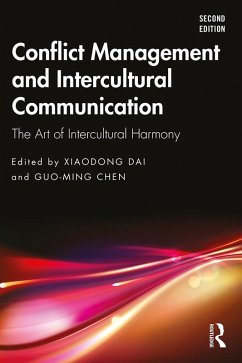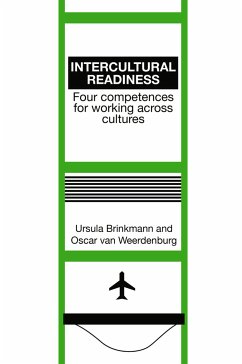The book begins with the theoretical perspectives on conflict management and harmony building. It examines intercultural communication ethics, diversity and inclusion, conflict resolution, conflict face negotiation, and intercultural competence. It presents both Western and non-Western perspectives. The book then addresses in its second section conflict management and harmony building in specific contexts. These include communication in intergenerational relationships, multinational corporations, and virtual spaces, and covers a range of national cultures including the USA, Japan, Germany, and China.
Drawing on the current research findings, this book covers the major theoretical perspectives and provides for a wide range of discussions on intercultural conflict management. It is a crucial reference for teachers, students, researchers, and practitioners alike.
Dieser Download kann aus rechtlichen Gründen nur mit Rechnungsadresse in A, B, BG, CY, CZ, D, DK, EW, E, FIN, F, GR, HR, H, IRL, I, LT, L, LR, M, NL, PL, P, R, S, SLO, SK ausgeliefert werden.
Donal Carbaugh, Professor Emeritus, University of Massachusetts Amherst, USA
'This edited volume on intercultural conflict could not appear at a better time! Incorporating multidisciplinary approaches, perspectives, and contexts, the renown contributors suggest ways to explain and diffuse enduring conflicts, predict or prevent others from erupting, and how to address or handle tensions so that constructive interconnectivity can be realized. The book brilliantly includes both established and updated thinking, Eastern and Western approaches, theoretical and applied perspectives on complex conflict landscapes, and highlights future research directions on intercultural negotiation, mediation, and harmony. As the world grapples with complex tensions within or between persons, communities, groups, or nations, this work provides scholarly hope that conflict can be meaningfully understood in more cultural contexts and managed or resolved through initiatives based on intercultural insights.'
Steve J. Kulich, Professor, Past-President of the International Academy of Intercultural Research (IAIR) (2019-2021), Founder of the SISU Intercultural Institute (2006-) and the Journal of Intercultural Communication & Interactions Research (JICIR) (2021-, Peter Lang).
'Conflict Management and Intercultural Communication treats intercultural conflict from an impressive array of theoretical and philosophical perspectives. The book also creatively explores harmony-building in vital and fascinating contexts, including virtual environments. This book is a must-have resource for anyone interested in conflict resolution across cultural landscapes.'
Alberto González, Professor, College of Arts and Sciences, Bowling Green State University, USA









